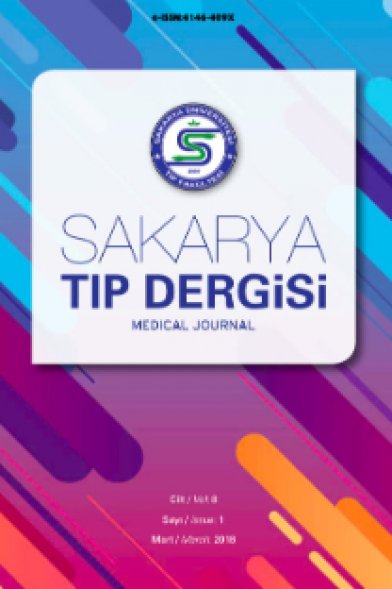Farklı İki Coğrafik Bölgede Yaşayan Gebelerin Duygu İfadeleri ve Gebeliğe Uyum Durumları: Macaristan ve Türkiye Örneği
Gebelik, duygusal uyum
Expression of Feelings by Pregnant Women Living in Two Different Geographic Regions and Their Adaptation to Pregnancy: Hungary and Turkey Cases
Pregnancy, emotional adaptation,
___
- 1. Mermer G, Bilge A, Yücel U, Çeber E. Evaluation of perceived social support levels in pregnancy and postpartum periods. J Psychiatric Nurs 2010; 1(2): 71-76.
- 2. Koyun A, Taşkın L, Terzioğlu F. Women health and psychological functioning in different periods of life: Evaluation of nursing approach. Current Approaches in Psychiatry 2011; 3(1): 67-99.
- 3. Kuğu N, Akyüz G. Psychical situation in pregnancy. Cumhuriyet Medical Journal 2001; 23 (1): 61-64.
- 4. Carter SK, Guittar SG. Emotion work among pregnant and birthing women. Midwifery 2014; 30: 1021-1028.
- 5. Coşar F, Demirci N. The effect of childbirth education classes based on the philosophy of Lamaze on the perception and orientation to labour process. S.D.U. Journal of Health Sciences 2012; 3(1): 18-30.
- 6. Shahoei R, Riji HM, Saeedi ZA. Kurdish pregnant women’s feelings: A qualitative study. Midwifery 2011; 27 (2): 215–220.
- 7. Daş, Z. Gebeliğin psiko-sosyal ve kültürel boyutu. Taşkın L, editor. Doğum ve Kadın Sağlığı Hemşireliği. Ankara: Sistem Offset Printing; 2016. S. 254-265.
- 8. Tortumluoğlu G, Okanlı A, Özer N. Cultural approach and importance in nursing care. Journal of Human Sciences 2004; 1 (1): 1-12.
- 9. Reszel J, Peterson WE, Moreau D. Young women’s experiences of expected health behaviors during pregnancy: The importance of emotional support. J Community Health Nurs 2014; 31: 198–211.
- 10. Da Costa D, Zelkowitz P, Bailey K, Cruz R, Bernard J-C, Dasgupta K, et al. Results of a needs assessment to guide the development of a website to enhance emotional wellness and healthy behaviors during pregnancy. J Perinat Educ 2015; 24(4): 213–224.
- 11. Mutlugüneş E, Mete S. The relationship between the role of motherhood and acceptance of pregnancy with nausea and vomiting during pregnancy. Cumhuriyet Nursing Journal 2013; 2(1): 8-14.
- 12. Beydağ KD. Adaptation to motherhood in the postpartum period and the nurse's role. TAF Preventive Medicine Bulletin 2007; 6(6): 479-484.
- 13. Demirbaş H, Kadıoğlu H. Adaptation to pregnancy in prenatal period women and factors associated with adaptation. Journal of Marmara University Institute of Health Sciences 2014; 4(4): 200-206.
- 14. Lederman R, Wels K. Psychosocial adaptation to pregnancy: Seven dimensions of maternal role development. In: Psychosocial Adaptation to Pregnancy, New York: Springer; 2009. p. 1-38.
- 15. İz FB, Temel AB. Cultural competency in nursing. Family Society and Education-Culture and Research journal 2009; April-May-June: 51-58.
- 16. Şahin NH, Bayram GO, Avcı D. Culturally sensitive care: Transcultural nursing. Journal of Education and Research in Nursing 2009; 6(1): 2-7.
- 17. Beydağ KD, Mete S. Validity and reliability study of the prenatal self-evaluation questionnaire. Atatürk University School of Nursing Journal 2008; 11(1): 16-24.
- 18. Chou FH, Avant KC, Kuo SH, Fetzer SJ. Relationships between nausea and vomiting, perceived stres, social support, pregnancy planning, and psychosocial adaptation in a sample of mothers: A questionnaire survey. Int J Nurs Stud 2008; 45: 1185-1191.
- 19. Turkey Demographic and Health Survey (TDHS). (2013). Ankara, www.hips.hacettepe.edu.tr/tnsa2013/rapor/TNSA_2013_ana_rapor.pdf, Erişim Tarihi: 10.12.2017.
- 20. Topçuoğlu S, Erçin S, Arman D, Gürsoy T, Karatekin G, Ovalı F.. Is adolescent or advanced maternal age risky for newborn? Retrospective results of a single center. Medical Bulletin of Zeynep Kamil 2014; 45(3): 131-35.
- 21. Fisher C, Hauck Y, Fenwick J. How social context impacts on women’s fears of childbirth: A western Australian example. Soc Sci Med 2006; 63: 64–75.
- 22. Hui Choi WH, Lee GL, Chan CHY, Cheung RYH, Lee ILY, Chan CLW. The relationships of social support, uncertainty, self-efficacy, and commitment to prenatal psychosocial adaptation. J Adv Nurs 2012; 68 (12): 2633–2645.
- 23. Körükcü Ö, Fırat MZ, Kukulu K. Relationship between fear of childbirth and anxiety among Turkish pregnant women. Procedia Social and Behavioral Sciences 2010; 5: 467-470.
- 24. Melender H-L, Lauri S. Fears associated with pregnancy and childbirth–experiences of women who have recently given birth. Midwifery 1999; 15: 177-182.
- 25. Baghdari N, Sahebzad ES, Kheirkhah M. The effect of pregnancy‐adaptation training package on the anxiety of pregnant women with a prior history of fetal or neonatal death. Journal of Midwifery and Reproductive Health 2015; 3(2): 355‐360.
- 26. López Araque AB, López Medina MD, Linares Abad M. Emotional state of primigravid women with pregnancy susceptible to prolongation. Invest Educ Enferm 2015; 33(1): 92-101.
- 27. Marín-Morales D, Carmona-Monge FJ, Peñacoba-Puente C, Díaz-Sánchez V., García-Huete ME. Influence of coping strategies on somatic symptoms in pregnant Spanish women: Differences between women with and without a previous miscarriage. Applied Nursing Research 2012; 25: 164-170.
- Yayın Aralığı: 4
- Başlangıç: 2011
- Yayıncı: Sakarya Üniversitesi
Otolog periferik kan kök hücre transplantasyonu sonrası mobilizasyon başarı oranı
Demet ÇEKDEMİR, Fergun YİLMAZ, Fatma OZSAN, Nur SOYER, Bahar ARİK, Sevgi MİR, Murat TOMBULOGLU, Ayhan DONMEZ
Semra Öz, Merve Pilavcı Adıgül, Mustafa Altındiş
P-Kumarik Asit, Renal İskemi Reperfüzyon Kaynaklı Akut Pulmoner Hasarı Azaltır
Hüseyin Buğra KARAKAŞ, Engin Denizhan DEMİRKIRAN, Necmettin Aydın MUNGAN, Bülent AKDUMAN
Bekir Enes DEMİRYÜREK, Ercan AYDIN, İbrahim KOCAYİĞİT, Selçuk YAYLACI, Atilla TEKİN, Esra DEMİRYÜREK, Ahmet Bilal GENÇ
Tiroid Fonksiyon Testlerindeki Bozulmanın Subjektif Tinnitustaki Rolü
Sıdıka Sinem GÜL, Bilgehan Atılgan ACAR
Hasta ve Sağlık Çalışanlarının, Hasta Hakları Konusunda Bilgi Düzeyleri: Bir Müdahale Çalışması
Özgür Erdem, Hediye Seval Akgün
Amifostin İnce Bağırsakları Kaspaz-3’ü Azaltarak Radyasyonun İndüklediği Apopitozise Karşı Korur
